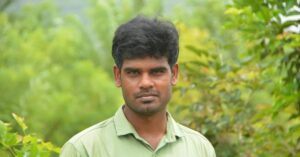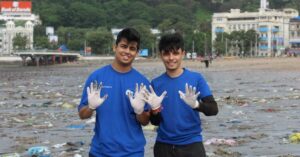Women in a Goa Village Are Making Eco-Friendly Sanitary Pads That Decompose in 8 Days
Till now they have sold 1000 pads and they manufacture 50 packets in a day.

We are all well aware about the issues related to waste management in our country. With rapid urbanisation we are consuming lot of disposal items which can’t be recycled or reused. One such item is the sanitary pad. These one-time use pads are made of plastic and hence are non-biodegradable. This menstrual waste lands in our landfills or worse in our water bodies, thus polluting our ecology.
According to a 2011 survey, only 12 per cent women in India use sanitary napkins which still makes for at least 9,000 tonnes of garbage and India produces over 1 billion non-compostable sanitary pads every month. And with modernisation this number is continuously increasing.
“Society in India still being largely conservative and patriarchal in nature, menstrual hygiene management has still not been planned well and women face issues in disposing sanitary pads in an appropriate manner,” says Sumit Singh, governance expert on Swachh Bharat Mission, Urban Development Department, Government of Goa. He further adds, “Sanitary pads are generally disposed with mixed waste or in dry waste bin category of door-to-door waste collection if the facility is available. This again poses problems to sanitation staff while segregating waste at processing plants. If the waste is simply dumped at a landfill site, it poses health hazards to waste pickers. In some of the progressive cities, municipal authorities raise awareness about wrapping the pad in old newspaper and marking it with a red cross before disposing it in dry waste bin. Some of the housing societies and girls schools have also started installing small incinerators to dispose sanitary pads. However, initiatives like this cover a miniscule portion of the population and all of the women living in urban and rural areas have to face the issue every month.”
However now there are few initiatives by individuals and groups to manufacture eco-friendly pads.

In collaboration with Aakar Innovations, The Better India is setting up a sanitary pad manufacturing unit in Ajmer, Rajasthan, that will not only produce eco-friendly or biodegradable sanitary pads, but will also employ women from rural communities around the area.
Contribute for the campaign here.
Unable to view the above button? Click here
The Self Help Group (SHG) named Saheli in Pilgao village in Bicholim taluka of Goa is the first SHG in Goa to manufacture and sell eco-friendly sanitary pads.
Jayshree Parwar, with the help of three other women, has started this initiative around two years ago. These pads are manufactured at Jayshree’s home where utmost care is taken regarding hygiene and sanitation. Till now they have sold 1000 pads and they manufacture 50 packets in a day. One packet consists of eight pads and its retail cost is Rs 40. They sell it under the brand name ‘Sakhi’ bio-degradable sanitary pads. “We get all our raw material from Tamil Nadu. The main component of it is the pine wood paper. This pad when buried in mud gets degraded within eight days,” says Jayshree who has taken this initiative of making and selling these pads.
You might also like: Demystifying Menstruation: These Women Educate Rural Girls & Provide Eco-Friendly Sanitary Napkins
She was trained by Dr Subbu Nayak and is now confident of this product and has trained other women—Naseeen Shaikh, Sulaksha Tari and Revati Parwar, who hail from the same village of Pilgao.
Jayshree was the first who showed confidence in accepting this challenge of installing and running a unit for manufacturing sanitary pads in her house. “When the company, Teerathan Enterprises, had approached a federation of 48 SHGs in the Panchayat with the offer of installing the unit free of cost, most of the SHGs shied away from accepting the offer mainly out of a feeling of shame. Jayshree accepted the challenge and has been running the unit for the last two years,” says Singh.
These sanitary pads consist of pine wood paper, silicon paper, butter paper, non-woven paper and cotton. They are UV light radiated which helps kills germs.
“Sanitary napkins made from artificial fibres cause allergies and irritation to the delicate skin in the vaginal area.

These napkins made from pine fibre, as they are natural, will help prevent these,” says Dr Anita Dudhane, allergist and clinical immunologist, practicing in Goa.
Jayshree further informs that eco-friendly pads are a good option for village women. Most of them use cloth pads which may not be a hygienic option and those who use sanitary pads tend to burn them by making a hole in the ground. But this practice produces hazardous gases like dioxins.
Marketing and sale of eco-friendly pads
As there is no retail outlet of this SHG, they sell it at various cultural fests like Lokotsav (annual art and culture festival organised by Government of Goa in joint collaboration of West Zone Cultural Centre, Udaipur in Panaji, Goa) and also at a café like Saraya Art Café at Sangolda. But, this journey is not easy for Jayshree. “Many a time women are hesitant to talk about this issue. Also sometimes girls are hesitant to look at these products when I put up a stall at these events. At that time I try to convince them that it is not something to be shameful about. We all go through this every month and we need to talk about it,” says Jayshree who has her regular clientele from her village and she also supplies to women customers from Kerala, Mangalore and Kolhapur. She is also positive with the response she is getting from her customers and also from her two daughters. She states that now her daughters are more confident and feel comfortable while using this product.
Now due to this product this SHG has got its unique identity. It has also given confidence to Jayshree to go out and talk about this topic and taboo associated with it. Jayshree informs that till now she has 50-odd women customers who are using this product. Most of these customers are the village women of Pilgao. These women are not only choosing it compared to their cloth pads but at the same time educating young girls about it. This product gives them a sense of confidence and freedom to go out and achieve their goals. One such customer is Afroz Sheikh who is now happy with this product. “Its main advantage is that it is chemical free. Also it is very convenient to use especially when we are travelling. With cloth pads it was quite a hassle as one had to wash it, dry it. But, this is a one-time use and also easy to dispose off. I am now also telling school and college going girls to use it as it is very beneficial to them.”
Another customer Niyati Patre from Mapusa city also opted for this. “The main reason I bought it was because it was eco-friendly. It was nice to know that I am not adding to bio-medical waste as it is biodegradable. The only issue I have is with its size. I wish it could be little bigger so it would be more beneficial especially during heavy flow days,” says Niyati.
Jayshree in future also wants to manufacture eco-friendly diapers as they are also in demand.
Looking at the commitment of Jayshree and the SHG many individuals and organisations are coming forward to help them to market this product.

One is the Goa Institute of Management (GIM). “Goa Institute of Management, Sakhali with intension to help the helped ones, started an ABHIGYAN “GIVEGOA”. Under this all first year students have to learn more from the community. This year we would like to help this lady from Sakhali with her maiden venture of ‘Sakhi: Green pads’. We would brand them, promote them, and create a market place. As they are cost positive and nature friendly a big market is waiting for them,” says Prof Vithal Sukhathankar of GIM.
Jayshree also spoke and interacted with SHGs and citizens in Bicholim and Valpoi during the city stakeholders meet on Swachh Bharat Mission about this product.
You might also like: Using Waste Cloth and Towels, 4 Rajkot Schoolkids Created Reusable Sanitary Pads for Women
Singh, who will help her marketing, adds, “I am planning to help her connect to the large network of SHGs working in urban areas. It will help Jayashree in getting a broad consumer base for her market without spending on marketing of the product, other SHGs will benefit in getting eco-friendly sanitary pads and it also provides them a potential livelihood opportunity to install and run similar plants.” He is also planning to introduce these eco-friendly sanitary pads to women in colonies selected for Smart Colony – Smart Ward initiative in all municipalities of Goa on pilot basis. He is hopeful that looking at Jayshree more SHGs from Goa will come forward. He has also received confirmation from one SHG to start the same. “If more SHGs start the unit, then raw material of sanitary pads which is currently brought through transport from Chennai can be manufactured by companies in Goa. This will further reduce the cost and make it more accessible in less privileged sections of society,” says Singh.
You can get in touch with them here.
Written by Arti Das.
In collaboration with Aakar Innovations, The Better India is setting up a sanitary pad manufacturing unit in Ajmer, Rajasthan, that will not only produce eco-friendly or biodegradable sanitary pads, but will also employ women from rural communities around the area.
Contribute for the campaign here.
Unable to view the above button? Click here
Like this story? Or have something to share?
Write to us: [email protected]
Connect with us on Facebook and Twitter.
NEW: Click here to get positive news on WhatsApp!
This story made me
- 97
- 121
- 89
- 167
Tell Us More
We bring stories straight from the heart of India, to inspire millions and create a wave of impact. Our positive movement is growing bigger everyday, and we would love for you to join it.
Please contribute whatever you can, every little penny helps our team in bringing you more stories that support dreams and spread hope.



















